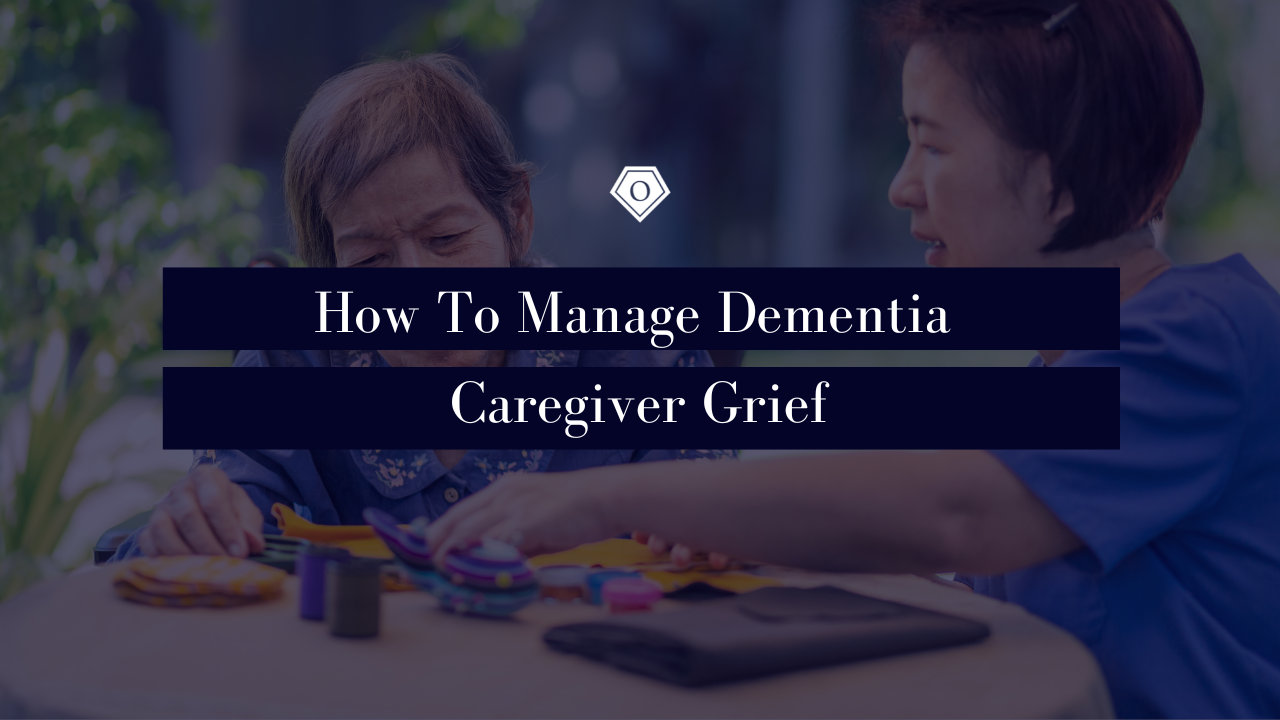Dementia caregiver grief is an intricate tapestry of emotions woven from the tender threads of love and the agonizing fabric of loss. As devoted caregivers navigate the arduous journey of caring for a loved one with dementia, they grapple with a profound sense of grief accompanying the relentless decline of cherished memories and fading connections.
Amidst the challenges of witnessing the person they once knew slip away into the shadows of forgetfulness, caregivers bear the weight of unspoken sorrows, seeking solace in the tender moments of lucidity and the remnants of a bond that withstands the test of time. In this delicate dance between devotion and despair, caregivers find strength in acknowledging and embracing their emotions, carving a path toward healing while tending to the evolving needs of those they hold dear. Here are strategies to help you cope with dementia caregiver grief:
Acknowledge your feelings:
Recognize that feelings of grief, sadness, frustration, and even guilt are normal reactions to the challenges of dementia caregiving. Allow yourself to experience and process these emotions without judgment. Acknowledging your feelings of dementia caregiver grief is a crucial step towards healing and finding emotional balance amidst the challenges of caregiving. It takes immense courage to confront the complex emotions that arise from witnessing the gradual decline of a loved one’s cognitive abilities and personality. By giving yourself permission to experience the full spectrum of grief, from sadness and frustration to guilt and even moments of relief, you validate the significance of your role as a caregiver and the depth of your love for the person with dementia. Embracing these feelings with compassion and understanding allows you to process the profound changes you are witnessing and find support in connecting with others who share similar experiences. In this acknowledgment process, you pave the way for a journey of healing, resilience, and growth, recognizing that caregiving is not just about the challenges you face but also a testament to the enduring bond and dedication that unites you with your loved one through the labyrinth of dementia.
Seek support:
Connect with support groups for dementia caregivers or talk to friends and family about your feelings. Sharing your experiences with others who understand can be comforting and validating. Seeking support for dementia caregiver grief is an essential lifeline that can provide solace and understanding in the midst of emotional turmoil. The weight of caregiving can be overwhelming, and sharing the burden with others who comprehend the unique challenges of dementia can make an immeasurable difference. Whether through support groups, online forums, or counseling services, connecting with fellow caregivers offers a safe space to express feelings without judgment, gain valuable insights, and learn coping strategies. Professional therapists specializing in grief and caregiving can provide personalized guidance, empowering caregivers to navigate the complex emotions that arise on this emotional journey. In seeking support, caregivers find a compassionate network that reminds them they are not alone, fostering resilience and the strength to continue providing loving care to their cherished ones while prioritizing their own well-being.
Educate yourself about dementia:
Understanding the progression and symptoms of dementia can help you come to terms with the changes you observe in your loved one. It may also assist in adjusting your expectations and approach to caregiving. As you navigate the emotional challenges of caregiving, arming yourself with knowledge about the disease can bring a sense of clarity and compassion to your journey. Learning about the various stages of dementia, its symptoms, and how it impacts cognitive functions can help you come to terms with the changes you observe in your loved one. This knowledge allows you to set realistic expectations and adapt your caregiving approach accordingly, fostering a deeper connection with the person behind the condition. Moreover, being informed about available resources, support services, and caregiving techniques equips you to provide the best possible care while safeguarding your own emotional well-being. Through education and self-awareness, you become a more resilient caregiver, better equipped to face the challenges of dementia caregiving with compassion, grace, and a renewed sense of purpose.
Take breaks and practice self-care:
Caregiving can be emotionally and physically demanding, so it’s crucial to take regular breaks and prioritize self-care. Engage in activities that bring you joy and relaxation, even if it’s just for a short time each day. Caring for a loved one with dementia can be emotionally draining, and neglecting your own well-being may lead to burnout and further distress. By giving yourself permission to step away from the caregiving role for a while, whether through respite care or assistance from others, you create space to recharge and rejuvenate. Engaging in activities that bring you joy, spending time with friends or pursuing hobbies, can help alleviate stress and renew your emotional reserves. Prioritizing self-care doesn’t diminish your commitment to your loved one; rather, it ensures you can provide the best possible care with a refreshed spirit and a stronger sense of balance. In this journey of caregiver grief, taking care of yourself becomes an essential pillar of resilience, allowing you to navigate the challenges with greater strength and compassion.
Seek professional help:
If you find your grief overwhelming or persistent, consider talking to a therapist or counselor who specializes in grief and caregiving. They can provide valuable guidance and support tailored to your specific situation. The emotional toll of caregiving and witnessing the gradual decline of a loved one can become overwhelming, and seeking support from a therapist or counselor can provide a safe and confidential space to process complex emotions. Professional counselors specializing in grief and caregiving can offer valuable insights, coping strategies, and personalized guidance tailored to your unique situation. They can help you explore your feelings of loss, guilt, and sadness, and assist in developing healthy coping mechanisms to manage the challenges of caregiving. Through this therapeutic journey, you gain a deeper understanding of yourself and your grief, allowing you to find resilience, compassion, and a renewed sense of purpose in your caregiving role. Remember, seeking professional help is a courageous step towards prioritizing your well-being and ensuring you can continue to provide loving care to your loved one with dementia while tending to your own emotional needs.
Practice mindfulness and stress-reduction techniques:
Mindfulness meditation, deep breathing exercises, and yoga can help you manage stress and maintain emotional balance during challenging times. By acknowledging and observing your feelings without judgment, you can gradually release the weight of grief and cultivate a sense of resilience. These practices not only help manage stress but also create space for self-compassion and self-care, empowering you to navigate the complexities of caregiving with greater clarity, patience, and a renewed sense of purpose. Embracing mindfulness becomes a profound act of healing, allowing you to honor your emotions while providing loving care to your cherished one with dementia.
Set realistic expectations:
Accept that you cannot control the progression of dementia or the changes it brings. As the journey of caregiving unfolds, it becomes crucial to acknowledge that dementia is a progressive condition with unpredictable outcomes. Accepting that you cannot reverse the course of the disease allows you to focus on providing the best possible care within your capabilities. Embracing realistic expectations also means understanding that the person with dementia may not always recognize or remember your efforts, which can be disheartening. However, by acknowledging these limitations and letting go of unrealistic hopes, you free yourself from unnecessary guilt and frustration. Instead, you can celebrate the small victories, cherish moments of connection, and find solace in knowing that the love and care you offer are invaluable, even in the face of an unyielding adversary like dementia. By setting realistic expectations, you empower yourself to be a more resilient and compassionate caregiver, navigating the grief with grace and unwavering dedication.
Celebrate the small moments:
While dementia may impact your loved one’s memory and cognition, there can still be moments of connection, joy, and love. Celebrate these small moments and cherish the time you have together. Whether it’s a brief smile, a shared laugh, or a glimmer of recognition, these tiny gestures become cherished treasures that remind caregivers of the enduring bond they share with their loved ones. By embracing and celebrating these precious instances, caregivers are reminded that even in the face of cognitive decline, the essence of their loved one remains, transcending the barriers imposed by dementia. These small moments become a testament to the profound impact of love and care, giving caregivers the strength to persevere and infusing the journey with hope and gratitude amidst the complexity of grief.
Engage in meaningful activities:
Encourage your loved one to participate in activities that they can still enjoy and find purpose in. Engaging in meaningful activities can provide a sense of fulfillment for both you and your loved one. Whether it’s listening to familiar music, looking through old photo albums, or participating in gentle exercises, these purposeful endeavors offer respite from the weight of grief and open windows to the person’s past and present self. In these shared moments, caregivers find solace in the knowledge that they are enriching the quality of life for their loved ones and fostering a sense of connection that transcends the limitations of dementia. Engaging in meaningful activities becomes a lifeline, reminding caregivers of the enduring bond that intertwines their lives, and providing a source of comfort and purpose through the labyrinth of dementia caregiver grief.
Consider respite care:
Taking short breaks by utilizing respite care services can give you the opportunity to recharge and tend to your emotional well-being without compromising the quality of care for your loved one. Respite care provides caregivers with temporary relief, enabling them to take a step back from their caregiving responsibilities while ensuring their loved one receives professional and compassionate care in their absence. Whether it’s for a few hours, a day, or longer, respite care grants caregivers the time and space to engage in self-care, attend to their own well-being, and find moments of rejuvenation. By seeking respite care, caregivers can approach their role with renewed energy, patience, and resilience, ultimately enhancing the quality of care they provide and supporting their emotional well-being as they navigate the journey of dementia caregiver grief.
Remember that it’s normal to experience a range of emotions as a dementia caregiver. Be kind to yourself and remember that you’re doing the best you can in a challenging situation. Seeking support and taking care of your own well-being are essential steps in managing caregiver grief effectively.






